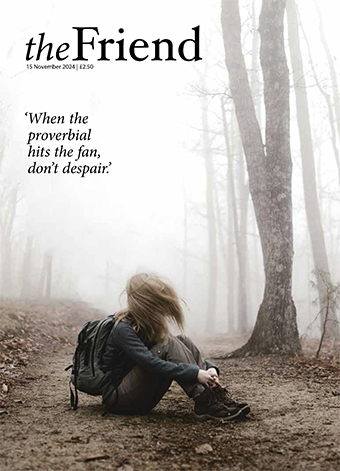
The Friend is a weekly magazine in which Friends speak to each other and to the wider world, offering their insight, ideas, news, nurture and inspiration.
Nurturing Quaker community, each issue offers a space for Friends to share their concerns, and to support each other in faith and witness.
The Friend: enriching, inspiring and connecting the Quaker community since 1843.
Someone quotes it after every election: ‘We are not for names, nor men, nor titles of Government, nor are we for this party or against the other… but we are for justice and mercy and truth and peace and true freedom, that these may be exalted in our nation.’ Edward Burrough, of course, in 1659.
When faced with ten kilogrammes of tomatoes for chopping, time seems to stand still. But it’s Friday already, and I have been in Calais for four days.
What use is spirituality when you are really upset?
That’s an angry way of putting it, but when the proverbial has hit the fan – when your world has turned upside down, and you are feeling rejected, abandoned, angry, fearful, desolate, sad, furious and sad again – is spirituality, and spiritual practice, any help at all? Is there a Quakerly response? Can one have all these feelings and still connect with a sense of something greater? That’s the question facing me right now, and I would like the answer to be yes.
We met online, via Zoom. After routine business, we had an inspiring presentation from our coordinator, Carina Mundle Garratt, who had attended the conference on the Future of British Quakerism. In small groups we discussed: what gives us joy in our Quaker communities? What kind of organisation and infrastructure do we need to sustain our spiritual lives and witness? Given the context in which we live – ecological crisis, conflict and trauma across the world – how can we look for joy? How can we acknowledge our own pain and grief while trying to move forward with positive change, one step at a time?
Towards the end of her book, Moira Fitt asks: ‘Do we open ourselves to the possibility of experiencing a new sense of spiritual reality which will feel appropriate for us?’ This very readable work describes the ways in which Fitt did this, particularly in the second half of her life. Some of these ways came through opportunities she sought, and some were the outcome of invitations from others, to which she responded positively, even if not sure at the time what the outcome would be. She was a Friend for most of her adult life, active locally, nationally and internationally.
It must occasionally happen that translators would rather not work on a particular passage. Perhaps such a thing happened to the Scottish Chartist Helen Macfarlane when she was translating The Communist Manifesto from its original German. She was a socialist with strong religious beliefs, whereas Karl Marx and Friedrich Engels seem to have regarded religion as a dead end.

Become a subscriber to enjoy unlimited access to our articles, dating back to 2009! Online subscribers get the Friend to their inbox each week, can comment on articles, and dive into our 1914-18 digital archive too!
Whether you are new to Quakerism or have been going to Meeting for years, you’ll find something here to inspire, inform and challenge you.
News | Views | Reviews
Written by and for Friends on the bench
Subscribe